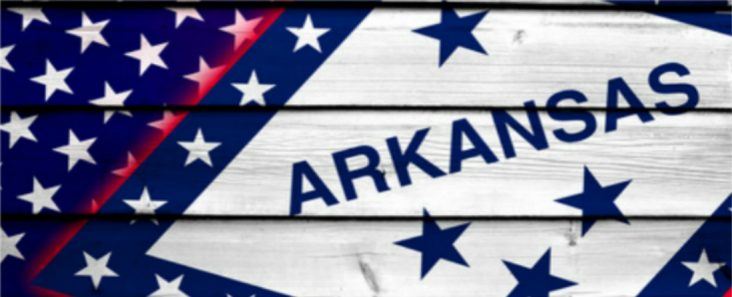Poll: Donald Trump extends lead over Hillary Clinton in Arkansas
by September 22, 2016 4:21 pm 1,058 views

A new Talk Business & Politics-Hendrix College survey shows that Republican Presidential nominee Donald Trump has widened his lead over Democrat Hillary Clinton by another 10 points from late June.
The poll, conducted among 831 likely Arkansas voters on September 15-17, 2016, shows Trump with a 21-point lead over the former Arkansas First Lady. The survey has a margin of error of 3.4%.
Q: If the election for President were today, which candidate would you support?
34% Democrat Hillary Clinton
55% Republican Donald J. Trump
3% Libertarian Gary Johnson
0.5% Green Party candidate Jill Stein
3.5% Other
4% Undecided
In late June, Trump stood at 47% among Arkansas voters to Clinton’s 36%. It would appear from the results that Clinton is now considered a “national Democratic candidate” with close ties to President Obama versus having a strong political connection to the state’s voters. Clinton’s current voter support is equal to Obama’s job approval rating in Arkansas.
Q: Do you approve or disapprove of the job President Barack Obama is doing?
34% Approve
60.5% Disapprove
5.5% Don’t Know
Of interest among the demographics of the poll is a higher percentage of state voters identifying as Republicans.
Q: Generally speaking, do you usually think of yourself as a Democrat, a Republican, an Independent, or other?
32% Democratic
43% Republican
20% Independent
5% Other
“With under 50 days to go, this race is clearly moving in Donald Trump’s direction in Arkansas,” said TB&P’s Roby Brock. “He has improved his performance among a variety of different voting groups and with a stronger identification of the state’s voters with Republican candidates, I don’t see momentum moving in another direction unless a major catastrophe occurred.”
More survey results will be released over the next several days related to the U.S. Senate race and several ballot proposals.
ANALYSIS
Dr. Jay Barth, professor of political science at Hendrix College, helped craft and analyze the latest poll. He offered this analysis of the poll results:
Donald J. Trump has opened a sizable lead with Arkansas’s electorate with seven weeks to go until Election Day 2016. Early signs in this election cycle were that Hillary Clinton, the state’s former First Lady, might close the gap from recent presidential elections in the state (President Obama gained only 37% of the state’s vote in 2012). Our most recent survey suggests that this is likely not to be the case. Indeed, it’s possible that Clinton could lose by as large a margin as did Obama.
While both parties’ advocates are now strongly in support of their nominees, a significant gap has emerged between Republican and Democratic identifiers in the state (more on that in a moment). Moreover, independents now skew towards Trump by a three to one margin (60% to 20%). Although Clinton is doing better among female voters in Arkansas, she is losing both men and women decisively. There is little variation across age groups. Clinton is winning African-Americans fairly decisively. Geographically, the Second Congressional District (central Arkansas) is quite close between the two candidates, but Trump has wide leads in the three other Congressional Districts.
Since 2008, partisan politics in Arkansas has been defined by white Arkansans’ negative perceptions of President Obama. That reality continues to show itself in our most recent survey where only one-third of the entire Arkansas electorate views the President’s job performance favorably. Indeed, barely a quarter (27%) of white voters view his job performance favorably. His approval is high among African Americans (73% approval) and among Democrats (84% approval) and there is a decided gender gap with women more approving of Obama’s performance in office. But, those favorable views of Obama are exceptions in a state where the bulk of the state’s voters have never warmed to the President.
This pattern becomes more exceptional as Obama’s approval numbers have risen nationally. Indeed, one of the most important dynamics that has developed during the 2016 campaign season is Obama’s growing popularity, now reaching as high as 58% in some national surveys. As incumbent presidential approval is one of the most important explainers of the outcome of the presidential election, the man who defeated Clinton for the 2008 presidential nomination may be the person who saves her in this cycle.
We purposefully avoid weighting our surveys on party identification because that characteristic is malleable. Instead, we only weight our surveys on demographic characteristics in the Arkansas electorate that are known from previous elections. This survey, however, shows a sharp uptick in GOP identification with 43% of the state’s voters identifying as Republicans. Only time will tell whether this sample is skewed in a GOP direction or whether this is now the “new normal” in Arkansas politics as the large chunk of independents who lean Republican have shifted towards identification with the Republican party and there is now a GOP plurality in the state’s electorate.
Indeed, just as important as the increase in Republicanism in the sample is the sharp decrease among Independents—down to 20% in this sample. These partisan shifts have clear implicationS for the future of partisan politics at all levels in Arkansas.
METHODOLOGY
This survey was conducted on September 15-17, 2016. The poll, which has a margin of error of +/-3.4%, was completed using IVR survey technology among 831 Arkansas likely voters statewide.
All media outlets are welcome to reprint, reproduce, or rebroadcast information from this poll with proper attribution to Talk Business & Politics and Hendrix College.
For interviews, contact Talk Business & Politics Roby Brock by email at [email protected] or Dr. Jay Barth by email at [email protected].
